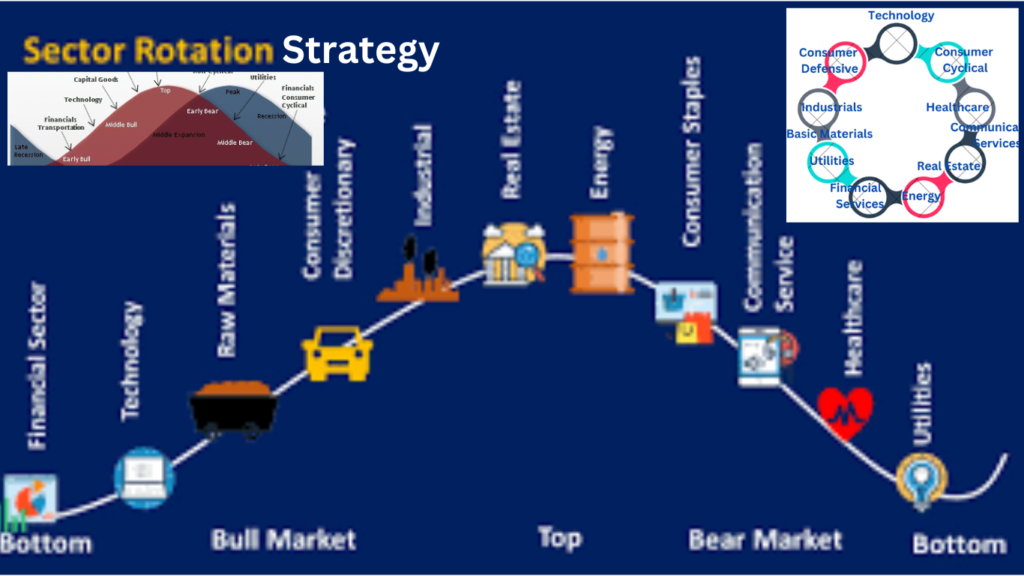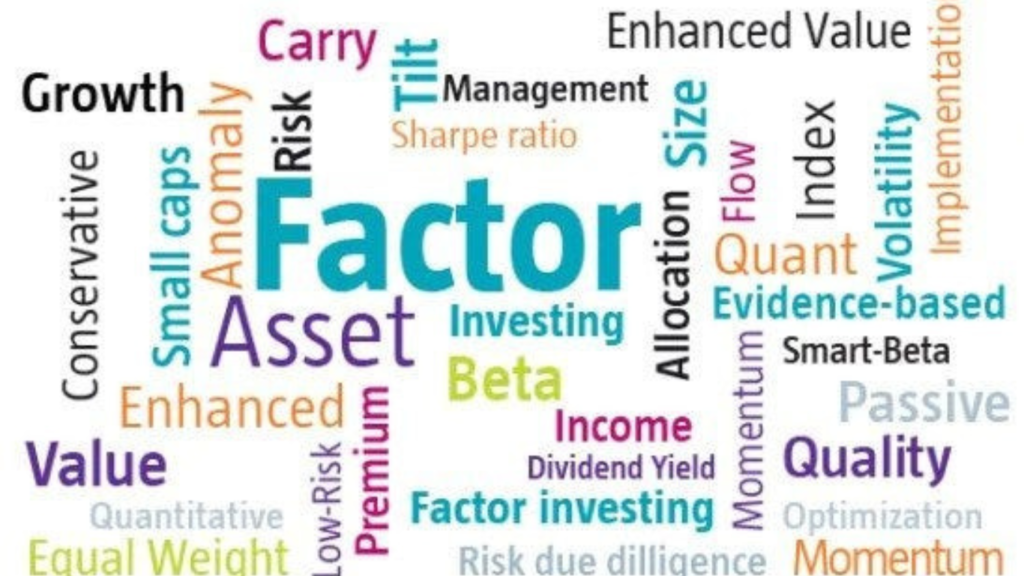Table of Contents
ToggleInvestment Strategies

Sector Rotation Strategy
- Economic Cycles: Adjust your portfolio to rotate between different sectors based on the stage of the economic cycle. For instance, during economic expansions, focus on cyclical sectors like technology and consumer discretionary; during contractions, shift to defensive sectors like healthcare and utilities.
- Sector ETFs: Use sector-specific ETFs to efficiently execute sector rotation strategies.
Example: Shifting investment from energy to technology as the economy moves from contraction to expansion.

Event-Driven Strategies
- Mergers and Acquisitions: Invest in companies involved in mergers or acquisitions, taking advantage of the price movements during these events.
- Earnings Surprises: Trade on stocks that beat or miss earnings expectations, as these can lead to significant short-term price movements.
- Product Launches and Regulatory Approvals: Anticipate market reactions to significant events like new product launches, FDA approvals, or major contract wins.
Example: Trading stocks like Biogen when awaiting FDA approval for a new drug.

Quantitative Trading Models
- Algorithmic Trading: Use computer algorithms to automate trading strategies based on complex mathematical models. These can execute trades at high speed and efficiency.
- Quantitative Analysis: Develop and use quantitative models to identify trading opportunities based on historical data and statistical analysis.
Example: Renaissance Technologies’ Medallion Fund, which uses sophisticated quantitative models to achieve exceptional returns.
Smart Money Flow Tracking
- Institutional Investment Trends: Follow the investment patterns of large institutional investors, hedge funds, and mutual funds. These entities often have extensive research resources and insights into market trends.
- 13F Filings: Analyze quarterly 13F filings with the SEC to see the holdings of large institutional investors.
Example: Mimicking the stock picks of renowned investors like Warren Buffett through their disclosed holdings.

Pairs Trading
- Statistical Arbitrage: Trade pairs of stocks that have historically moved together but have temporarily diverged. The strategy involves buying the underperforming stock and selling the outperforming one, expecting them to revert to their historical correlation.
- Market Neutral: This strategy aims to be market neutral, reducing exposure to overall market risk.
Example: Trading pairs like Coca-Cola and PepsiCo when their price correlation diverges significantly.
Analysis

Insider Sentiment Analysis
- Insider Trading Patterns: Track the buying and selling activities of company insiders (executives, directors). Insider buying can signal confidence in the company’s prospects, while selling may indicate potential issues.
- Form 4 Filings: Monitor SEC Form 4 filings to see insider transactions, and analyze these for potential stock moves.
Example: Observing significant insider buying trends in a company like Tesla could indicate future growth and market confidence.

Using Alternative Data Sources
- Non-Traditional Data: Leverage alternative data such as satellite imagery, credit card transaction data, and web traffic statistics to gain unique insights into company performance and market trends.
- Big Data Analytics: Employ big data analytics to process and analyze these non-traditional datasets for actionable trading signals.
- Example: Using satellite data to analyze car counts in retail store parking lots to predict quarterly sales for companies like Walmart.

Sentiment Analysis and Social Media Monitoring
- Market Sentiment Tools: Use tools that analyze sentiment from news, social media, and blogs to gauge investor mood and potential stock movements.
- Social Media Influence: Monitor platforms like Twitter, Reddit, and StockTwits for trending stocks and investor sentiment.
Example: Capitalizing on the rapid rise in stock prices like GameStop, driven by social media communities such as WallStreetBets.

Factor Investing
- Multi-Factor Models: Invest based on multiple factors such as value, momentum, size, quality, and low volatility. Different factors perform well under different market conditions.
- Smart Beta ETFs: Use smart beta ETFs that track specific factor indices to implement this strategy.
Example: Allocating to value stocks during market downturns and shifting to momentum stocks during bull markets.

Dark Pool Trading Analysis
Dark Pools: Monitor trading activity in dark pools, private exchanges where large trades are made anonymously. These trades can indicate significant moves by institutional investors.
Implementing and Managing Secret Strategies:
- Developing Proprietary Algorithms:
- Custom Algorithms: Invest in developing proprietary trading algorithms tailored to your strategies.
- Backtesting: Rigorously backtest these algorithms using historical data to ensure their effectiveness and robustness.
- Staying Ahead with Technology:
- Advanced Tools and Platforms: Use advanced trading platforms and tools that offer real-time data and sophisticated analytics.
- Automation: Automate trading strategies where possible to execute trades with precision and speed.
- Continuous Learning and Adaptation:
- Keep Abreast of Innovations: Stay updated on new technologies, strategies, and market trends to continuously refine and enhance your trading approach.
- Adapt to Market Changes: Be flexible and ready to adapt your strategies as market conditions and economic environments evolve.
- Risk Management:
- Diversified Approaches: Implement multiple strategies to spread risk and reduce the impact of any single strategy’s underperformance.
- Robust Risk Controls: Establish strict risk management protocols, including stop-loss orders, position sizing, and portfolio diversification.
- Professional Networks and Insights:
- Industry Connections: Build a network of professionals and analysts who can provide insights and access to advanced trading techniques and data.
Collaborate with Experts: Partner with or consult experts in fields like data science, financial engineering, and quantitative analysis.
Disclaimer:The information provided on this platform is for general informational purposes only and is not intended as financial or investment advice. All information on this platform is provided in good faith; however, we make no representation or warranty of any kind, express or implied, regarding the accuracy, adequacy, validity, reliability, availability, or completeness of any information on the platform.
